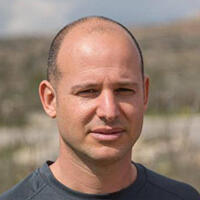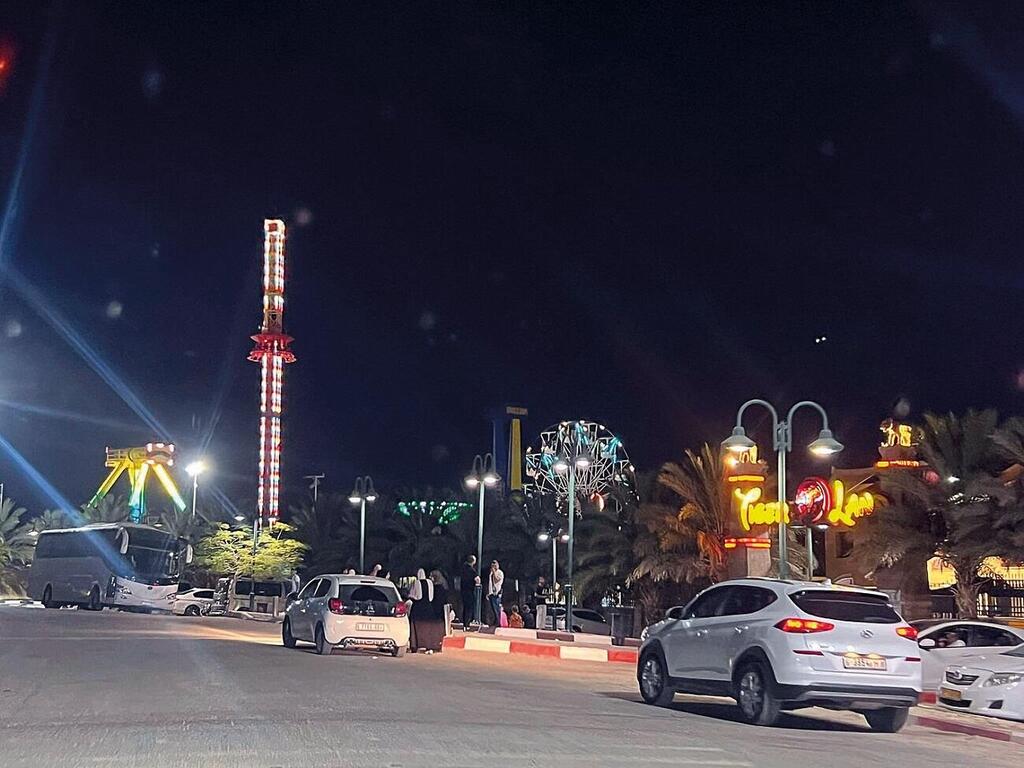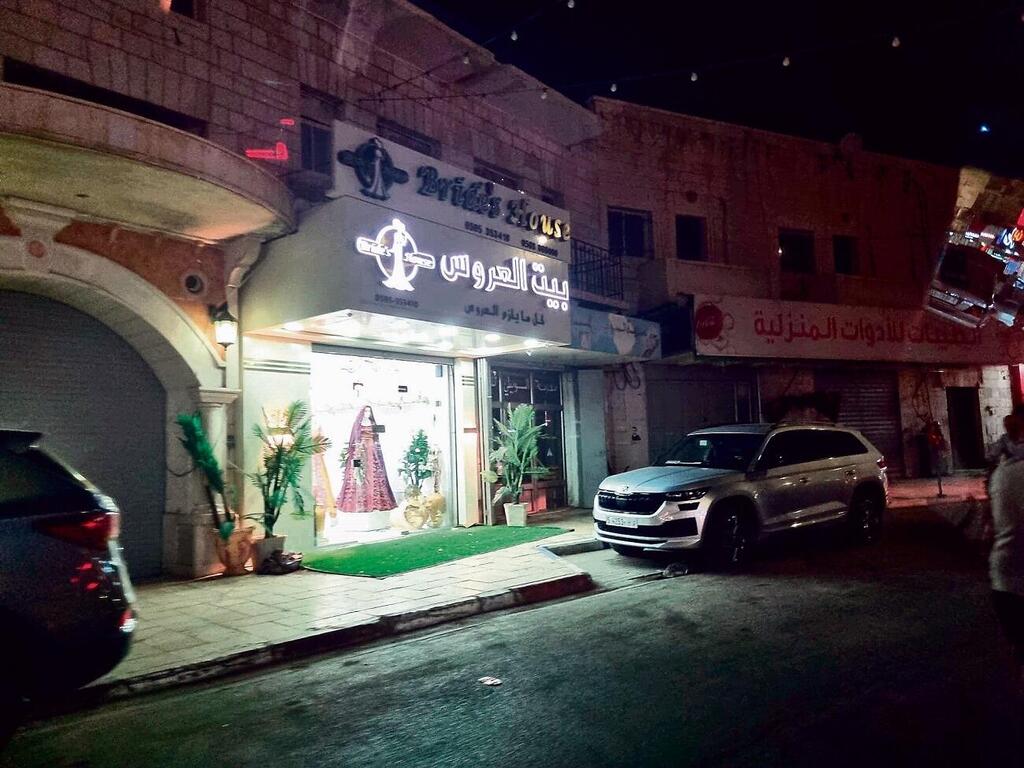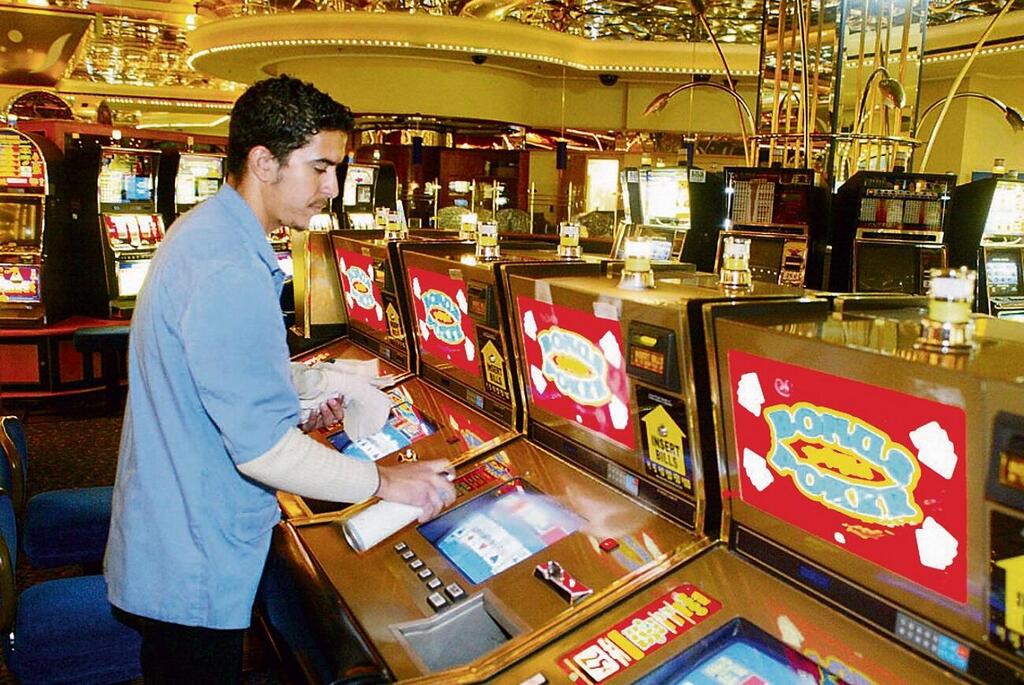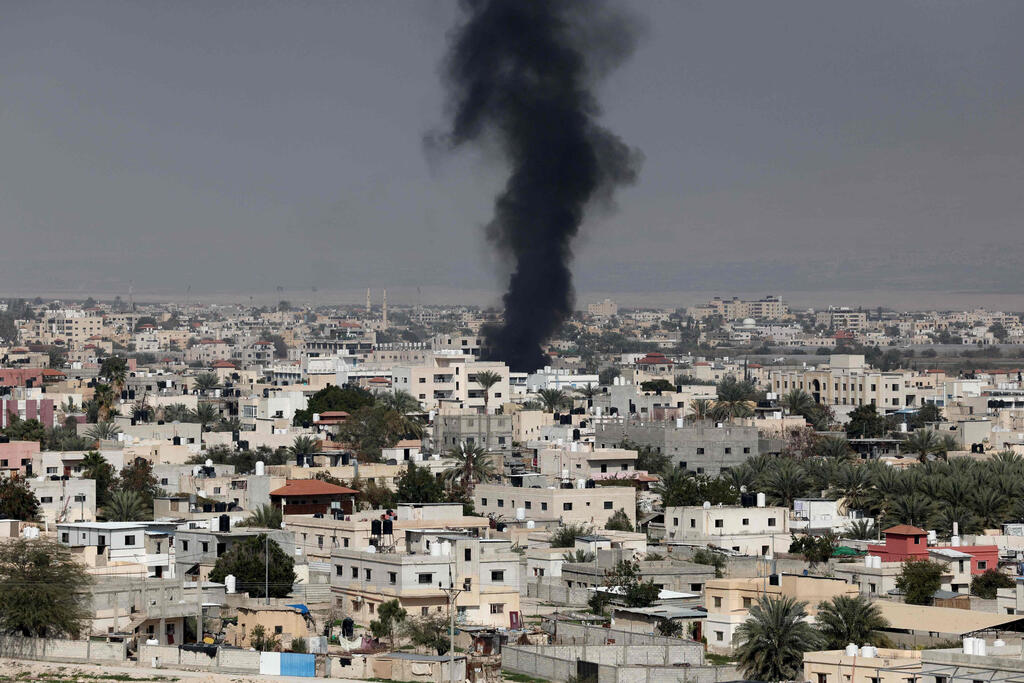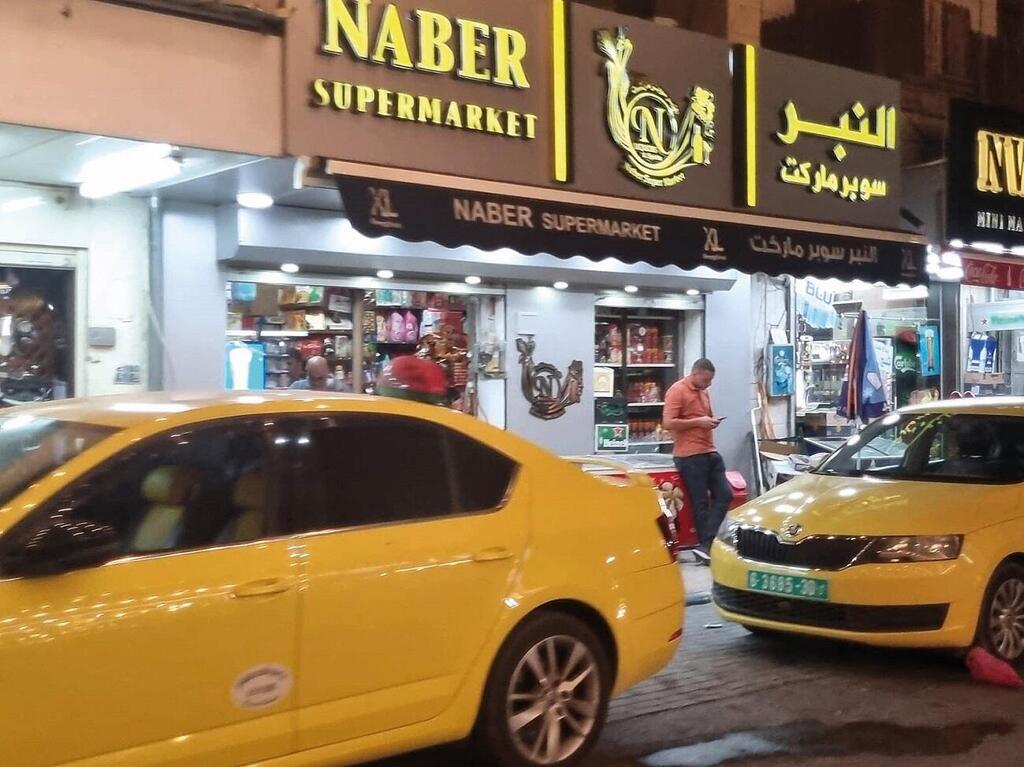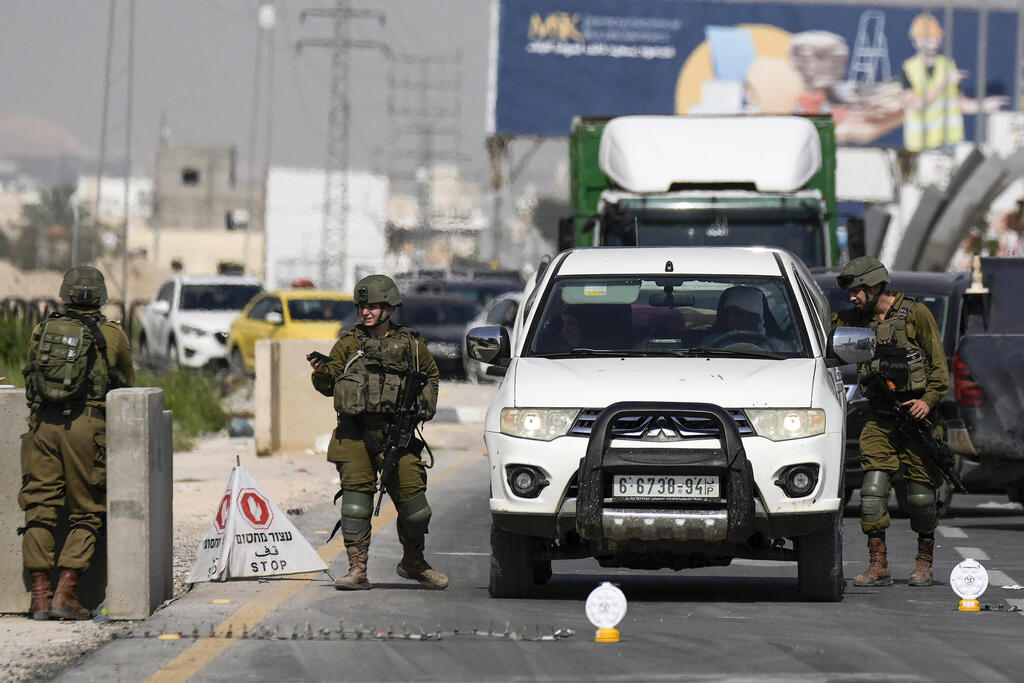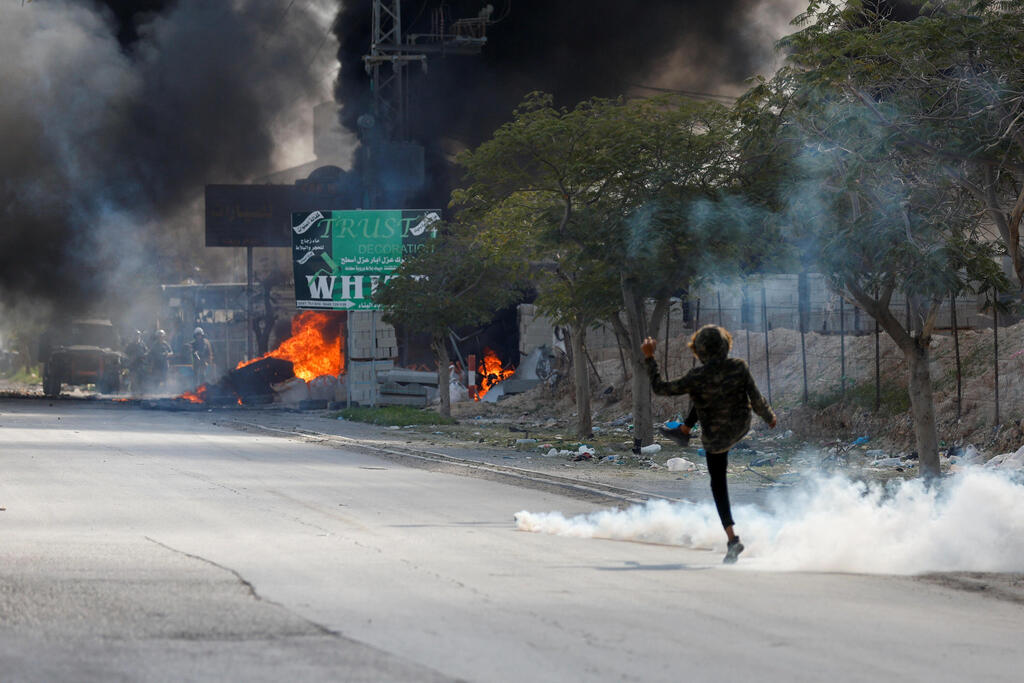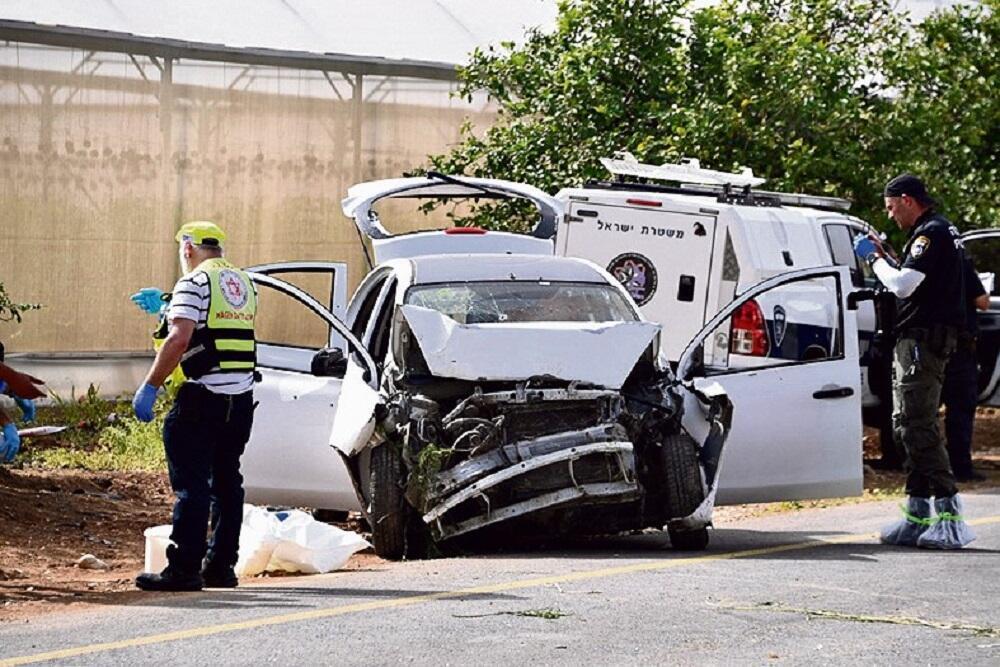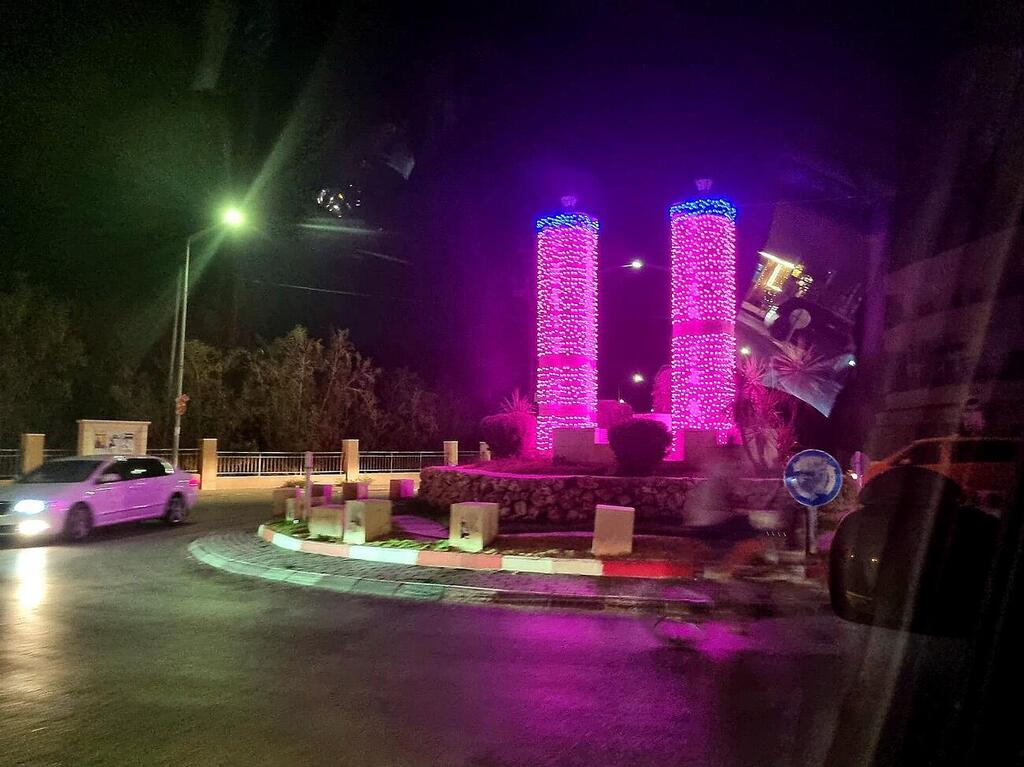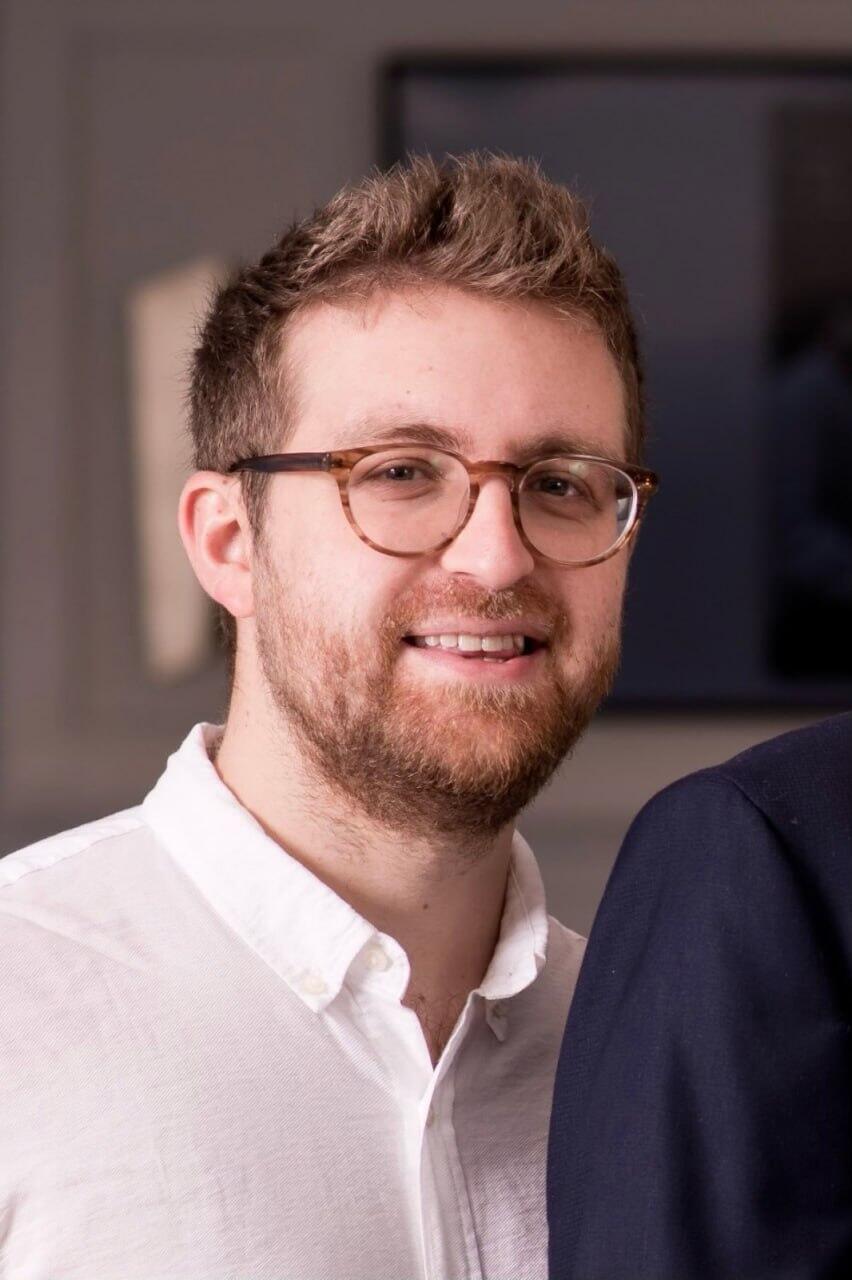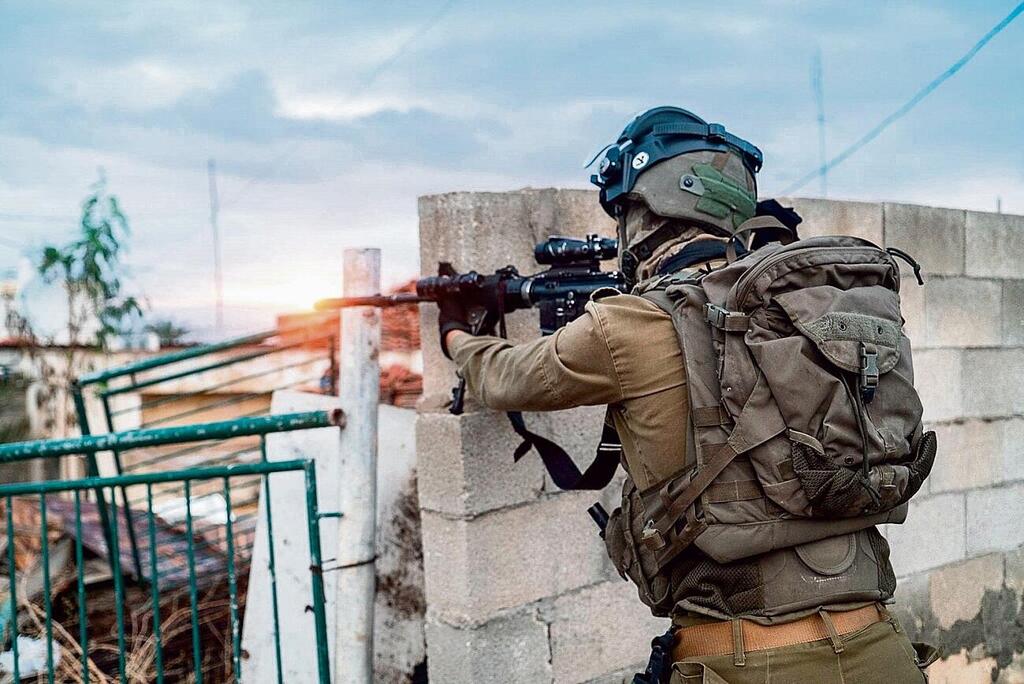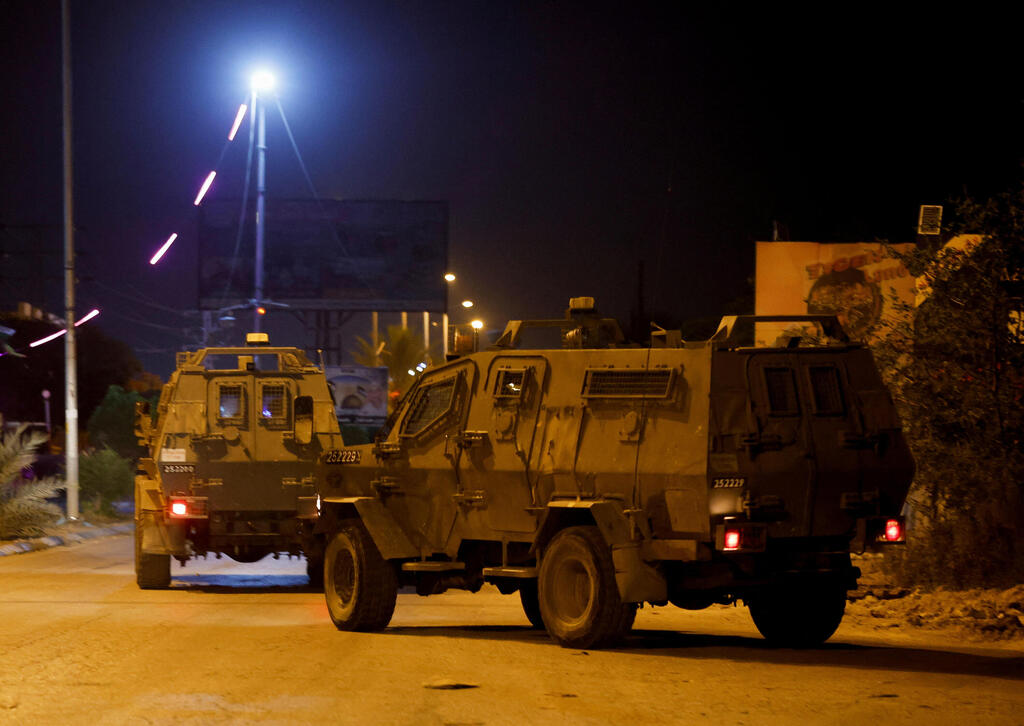Getting your Trinity Audio player ready...
Tawfiq decided to take a side road before we drove into Jericho. He was born and raised here and for years, had businesses in town and knows every nook and cranny. "We have to make a detour and come in from the other side," he says. "Unfortunately, Jericho is not what it once was. I know this is a longer route, but there is no other way. Sorry," he says.
More stories:
Have things deteriorated that much? Yes. It is nothing like it was before. I remember going to weddings at the nearby Vered Yericho settlement, where I have friends. Now I can only dream of such a thing. Everything has changed.
Jericho is trying to project business as usual. Billboard signs promoting exclusive housing projects greet visitors driving in through the stone gates to the city and giant amusement parks light up the night sky, but the residents know things are not normal.
In these early evening hours, residents are out on the streets, shopping and dining. Jericho has vast reserves of land and construction is everywhere. The city's flagship project is called "The Gate to Jericho" and will include nearly 2,500 individual homes for sale or rent, near a new hotel that is being built. Another high-end housing project is coming up in the northern part of the city.
Construction workers will be on the job, into the late hours of the night. "This is how it's done her," we are told. 'Have you ever tried lifting a sack of concrete in the middle of the day in Jericho in August? Construction workers work through the night and sleep all day."
Millions in losses
The battle for Jericho's future is being waged out of the public's sight and is more dramatic than it appears. The quiet desert oasis, famed for its palm trees, is in the midst of a struggle that may affect security along Israel's entire eastern frontier.
On one side are the residents, mostly merchants who rely on tourism, and on the other, is the pressure cooker we call a refugee camp, which is located to the south and is affiliated with the Fatah movement. But in recent months, Hamas is gaining strength, and funding for terrorism is drawing in the local youth who have been inspired by events in the Jenin refugee camp.
This is felt not only in the atmosphere. A Hamas terror squad working from within the camp succeeded in launching two deadly attacks in the area, once considered peaceful.
"What's been happening in the camp is total shit. A big mess," Tawfiq says as we drive. Through town. "A couple of days ago the military drove into the camp in a convoy. I was at work. Lots of soldiers. Everyone knows what to do when that happens. I closed up my shop and went home. I heard explosions and gunfire. Some kids were arrested, and they left. But you never know when they will be back, so I kept the shop closed. No one would be coming in, anyway. So, another day's business was lost."
He sees Jericho changing before his eyes. "My biggest fear is that our city would be shut down with roadblocks. This will strangle us. Jericho has not been like that for 20 years. I've been here since I was born. My father had a business before 1948. He supplied gasoline to the Jews. Then tourism began to develop. Remember the Casino? Now it's all a distant memory."
According to security officials, tourism was up from 5,700 in 2021. To 118,500 in 2022 after the COVID pandemic. They attribute a lot of it to the security situation but as terror incidents increased around the refugee camp, the number of tourists dropped considerably and the city was placed under curfew twice already, this year.
The financial damage is immense and estimated at NIS 135 million in the first six months of 2023. During the Muslim holidays, roadblocks around the city, put there to catch a terror squad prompted tourist groups and Arabs from Israel, to cancel visits, costing an estimated NIS 80 million in damages. If in the past tens of thousands would visit the city each month, now there are dozens at best.
The Civil Administration says Jericho is affected by the uptick in violence across the West Bank and every terror attack, results in roadblocks around the city.
What's left of the iconic casino?
Our first stop is the Oasis Hotel, where once stood the famous casino built by Austrian Jewish millionaire Martin Schlaff. It used to be favored by Israelis. It could have been a symbol of coexistence, after the Oslo Accords but the Second Intifada, put an end to that and now, it is crumbling away.
From there we headed into the busy city center where the smell of meat rises from the incredibly inexpensive shawarma stands and shoppers rush in and out of stores and cafes, where luxury cars are parked, while taxies ferry passengers back and forth. "It can take 20 minutes just to cross the main road," Tawfiq says.
There are quite a few tourist attractions including the Russian Museum spread over three fancy buildings. The amusement parks are shutting down for the night and the families visiting, are heading back to their hotels.
"You see the potential for the local economy," Tawfiq says. "But when the troops come in, everyone runs off. What visitor from Hebron, Ramallah or Bethlehem would stay here?"
This captures the daily tension in Jericho. On one hand, local businesspeople are trying to develop as many economic projects as possible and bring back tourists with deep pockets. On the other hand, there is a dominant young population that is leaning toward terrorism.
Despite the series of terrorist attacks, officials in the Civil Administration say they are carrying out dozens of actions to separate terrorism from the general population and minimize harm to Palestinian civilians as much as possible.
"We are trying to allow for unhindered movement, especially toward industrial areas within the West Bank. After all, most of the laborers work in these places. During an attack, the primary concern is about impacting people's livelihoods and employment," says District Coordination and Liaison Abu Zalaf.
The issue of employment is critical. "We invest a lot of effort to ensure that workers from Jericho are employed. Because a worker from Jericho who has a job and earns money will not be tempted to engage in terrorism," says Abu-Zalaf.
"People from Jericho work in hotels at the Dead Sea, in the Mishor Adumim industrial park, at the Allenby Crossing and of course in agriculture in the Jordan Valley. They are not lacking places to work."
Why has the situation in Jericho become critical at this point in time?
"The city of Jericho had been calm for 20 years and served as a gateway to the world for Palestinians. They need to maintain the city because any act of terror and any harm to the city of Jericho has an impact on all residents of the West Bank. Since residents of Jenin, Nablus and other West Bank cities pass through Jericho, exit through the Allenby Crossing, and spend time in the city, it also affects them."
Radicalism spilling over from the refugee camps
Jericho, one of the oldest cities in the world, is divided into several distinct areas. The city has two refugee camps. Alongside Aqabat Jaber at the southern entrance, there is another refugee camp called Ein al-Sultan, located at the northern entrance.
Naturally, these camps are where the poorer and more vulnerable population is concentrated. This is also where confrontations with IDF forces occur, along with terrorist activities and army raids.
Visitors from the outside, primarily Israeli Arabs and Palestinians from Ramallah, Jenin, Nablus, Hebron and Bethlehem, who invest money in the city, tend to spend time in the Gate of Jericho area and in the city center. This is where most of the city's normative population resides.
The politics of the Palestinian Authority are also strongly felt here. Recently, Palestinian leader Mahmoud Abbas fired several West Bank governors, including the governor of Jericho Jihadi Abu-Al-Asal. "We were surprised," said the ousted governor, "no one spoke to us about the decision to retire us, and we were not informed in advance. We don’t know the reason."
Abu-Al-Asal is not very popular in the city. Residents accuse him of contributing to the decline of Jericho. "He is an agitator and goes along with the same youth in the refugee camps to try and gain their support, mainly against criminal elements," says a longtime resident.
"He doesn’t put them in their place; he doesn’t understand that he is causing damage to the city. He is afraid of what the extremists and criminal families in the refugee camps will do to him, so he helps them."
The refugee camp of Aqabat Jaber has become a barometer for both terrorism and trade in the city. The camp was established in 1948 and is located southwest of Jericho. About 10,000 residents live there, belonging to three main clans, in an area of approximately 420 acres. Most residents of the camp make a living from agriculture or working in Israeli territory.
"To understand how deep the commercial relationship is between the Jordan Valley and the people of Jericho and the refugee camp, let me tell you a story," says a security official from the valley.
"There is a relatively older Palestinian man living in Aqabat Jaber who works it maintenance at one of our farms in the valley. He comes to work every day from the refugee camp to the factory. Last February, when the IDF entered the refugee camp to arrest a terrorist cell that had carried out shooting attacks, his son was killed. According to the IDF, he had fired at the forces and was part of the riots in the area."
"A week after mourning his son, the father came back to work. He told us he has no other choice. He is angry about his son's death, that's clear, but earning a living for him is indispensable. Even the security establishment understood this and did not automatically revoke his work permit." In this case, after it was confirmed that he met all the criteria, his work permit was retained.
One of the main reasons for the rise in security tension in Jericho is the activity of Hamas in the refugee camp, which is ostensibly controlled by Fatah.
"The deceptive calm that existed here for years is now blowing up in our faces," admits a senior security official. "The IDF is investing significant resources in combating terrorism in Nablus and Jenin, and it's true—many attacks originate from there. But it's important to understand, the moment there is an attack in Huwara, all of Nablus and the surrounding villages get locked down, and then terrorism seeps in here. It's very simple. They realize there are fewer forces here, that this is a quiet area that isn't under close scrutiny, and they choose to strike.”
“This has been the reality for the past year. The only space available for terrorists to move around is here, in the Jordan Valley, in the surrounding villages, and in the refugee camps. The entire area is undergoing a very large incitement and we are seeing it."
A year of violence
"In the last 20 years, actually since Operation Defensive Shield, Jericho has been isolated from everything happening in the West Bank," explains Lt. Col. Salim Khayr, 35, the commander of the Jordan Valley's Lions Battalion, who previously served as the deputy commander of the valley.
"We used to experience escalations in the West Bank, but it didn't impact Jericho. In the past year, there has been an escalation. Terrorists and cells have started operating within the Aqabat Jaber refugee camp, leading to attacks. From an area that was quiet, we now receive a lot of intelligence about bad people with bad intentions who want to harm."
What does this mean for your operations in the field?
"Almost every night, I operate in Aqabat Jaber—arrests, weapons collection, activities we did not carry out with the same intensity in previous years. It's another area that has awoken to terrorism."
Why now? What happened?”
It's a combination of several factors, but primarily the lack of governance by the Palestinian Authority. Even the governor of Jericho, who was recently fired by PA, was an inciting factor. Anywhere there's a lack of governance from the PA, there is terrorism."
In the past year, the Jordan Valley has become a focal point for terrorist activities that have not occurred there for years.
In a shooting attack at the Hamra Junction last April, two terrorists ambushed the car of Lucy Dee, 48, and her daughters Maia, 20, and Rina, 15. The terrorists maneuvered their vehicle to be close to the girls' car and opened fire on them. Rina and Maia died instantly. Lucy was critically injured, taken to the hospital, and later declared dead. The attack shook the entire country.
A month after the attack, the IDF and Border Police special forces eliminated the two terrorists, who were hiding in an apartment in the casbah of Nablus. The terrorists did not come from Jericho, but chose to target an area considered to be quiet.
"This is an attack that is entirely the result of terror spilling over from the Jenin and Nablus areas to the Jordan Valley," says a concerned senior security official. "From Beqa'ot checkpoint (near Hamra in the Jordan Valley) to central Nablus is a seven-minute drive. It's easiest for them to strike here. Such incidents ignite the area and incite the youth in the refugee camps."
As far as the Central Command is concerned, the warning lights started flashing much earlier. "In the past two years, since Operation Guardian of the Walls, we are in a state of escalation and a wave of terror. Hamas and Islamic Jihad have already said dozens of times that they intend to ignite the entire West Bank, while simultaneously keeping Gaza calm. It's very convenient for them, peace in Gaza and resistance in the West Bank," explains a senior Central Command official. "Then we started experiencing the phenomenon of various places where the PA’s authority has eroded."
For example?
"The Jenin refugee camp, the Lions' Den in Nablus and a few more cases. It's like a plague that is spreading, especially in refugee camps that draw inspiration from the refugee camp in Jenin, which has become a symbol of the new and armed resistance of frustrated youth."
And yet, Jericho is a bit under the radar.
"In this context, the Aqbat Jaber refugee camp and the city of Jericho are among the quietest places in the Central Command sector. Until the events started, nobody even knew there was such a place as Aqbat Jaber. What's more, at the beginning of 2022, we started something amazing in Jericho and approved the entry of buses with Israeli visitors without any security at all. It was in coordination with the Palestinian security apparatus. For us, this was an amazing thing."
And then what happened?
"The warning lights started going off for us at the beginning of the year. We already received indications of a desire to carry out a terror attack, and we started to deepen our intelligence there."
This "terror plague," as it is called in the Central Command, was experienced by the IDF and the Shin Bet with two serious attacks that ended with severe consequences — but could have ended much worse.
On January 28, an armed terrorist arrived at a restaurant at the Almog Junction and opened fire on the numerous diners there. Luckily, the terrorist's weapon jammed, and there were no casualties. The terrorist immediately fled to Aqbat Jaber.
Exactly a month later, Elan Ganeles, an Israeli-American citizen, was murdered in a drive-by shooting near the Arava Junction on Route 90. The terrorists also fired at other vehicles, and fortunately, the number of casualties was not higher. After the shooting, the tracks again led to Aqbat Jaber. The terrorists set fire to the vehicle they used for the attack and fled to the refugee camp.
"We had warnings, and after the first attack at the restaurant, we realized that we have a serious Hamas cell there, and they are trying to carry out attacks," says a security official. "We knew the names, photos, residences and all the details of several terrorists."
Is this part of Hamas's attempt to ignite the Jericho sector?
"Absolutely. Hamas is constantly trying, and we are seeing this even now, to ignite as many sectors as possible in the West Bank. After the first attack, which was very severe from our perspective—although there were no casualties, it was a miracle given that the terrorist came in to 'spray' diners in the restaurant—we took significant action in the area. It's a race against time to see who will succeed in catching whom. Will they carry out an attack or will we catch them first?"
Plan B
On the other side of "significant activity in the area" are the residents. The reality in the Jordan Valley, the surrounding villages and Jericho, has always been quiet due to shared economic interests. There have been occasional cases of agricultural terrorism and theft, but the security threat was never as real as it is today.
"The thriving and successful agriculture in the Jordan Valley wouldn't exist without Palestinian workers," the source says. "Every respectable date farm employs between 150 to 200 Palestinians from the area. In fact, since the attack where they tried to burn a bus full of recruits last September, carried out by a farmer who lives in the valley and whose children were employed by Israelis at various stages, we have started to see a drastic rise in incitement and escalation in attacks."
"These have been the hardest days for us here," says the local merchant Tawfiq. "You need to understand, in Israel, that a lockdown on the city completely destroys it. It chokes it. There's nothing to do. No business. Everyone lives in fear. There are no people coming in, and nowhere to go out."
What does it look like from your perspective?
"When the army enters Jericho, it doesn't really encounter young people throwing stones and Molotov cocktails. There isn't much resistance. It mainly happens in the refugee camp. But the moment there's a lockdown, you have frustrated young people who don't understand the reality and might go out and confront the army. It's a never-ending cycle. I closed all my businesses that month and lost almost NIS 150,000. It will take many months to recover from that."
On the other hand, the Central Command source explains that the reality left them with no choice. "We do everything we can to separate terrorists from the population, especially in a city like Jericho, which is a quiet city that relies on its economy and tourism. But we were in a race against time and did a variety of things to avoid lockdowns."
During the curfew imposed on the city, two major operations were carried out by the Israeli forces to arrest active terrorist cells. They were either killed or captured. This is how other arrest operations ended this year.
However, alongside the successful activity of the IDF, the city experienced further economic decline. The never-ending cycle. "It was a difficult event here, for the city," says Ibrahim, a Jericho resident we meet at his shop in the city center.
"The whole city was closed, and soldiers entered. It immediately puts the city on alert, completely paralyzing it. I understand that the IDF entered to capture whoever carried out the attack, but one must understand that you can't punish an entire population for it. Why do we have to suffer because of the foolish act of a young man? It causes people to lose money and hope."
But the attacks didn't stop. Just at the beginning of August, another shooting attack occurred that resulted in "only" one injury.
The string of attacks has caused people in the valley to rethink their approach, and they are currently developing plans to strengthen defensive capabilities in the sector.
"We have a vast area here, huge distances between the settlements, and only two IDF battalions, which are also Border Police fighters and have not undergone infantry training. They are doing sacred work, but we understand that we need to take care of ourselves, and so we are trying to create as much security as possible," explains a security official in the valley.
The future of Jericho depends on its economy, which depends on stopping terrorism, which depends on the situation in the refugee camp Aqabat Jaber. "If the PA and the security apparatus do in Jaber what they are doing or trying to do in the Jenin refugee camp, and prevent the next attack or the next perpetrator—then the city will return to itself, and outsiders will come," says Lt. Col. Khayr.
"Those outsiders will invest money in projects, and the tourists will return. If this doesn't change, they will continue to see roadblocks around the city and IDF soldiers within the city. These days are a slippery slope. This is a moment of reckoning for the city."



